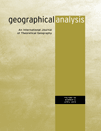
GEOGRAPHICAL ANALYSIS
Scope & Guideline
Unveiling Insights into Spatial Dynamics
Introduction
Aims and Scopes
- Spatial Modeling and Analysis:
The journal emphasizes the development and application of spatial statistical models, including geographically weighted regression and spatial econometric models, to understand complex spatial relationships and patterns. - Geographic Information Systems (GIS) and Technology:
A core focus is on the use of GIS technologies for data collection, analysis, and visualization, enabling researchers to explore spatial data in innovative ways. - Socioeconomic and Environmental Contexts:
Research often examines the interplay between spatial phenomena and socioeconomic factors, addressing issues like urban inequality, accessibility, and environmental impacts. - Methodological Innovations:
The journal promotes methodological advancements in geographical research, including machine learning applications, hybrid models, and new statistical techniques for spatial data analysis. - Public Health and Accessibility:
There is a consistent focus on public health issues, particularly the spatial analysis of health data, accessibility to services, and the impact of environmental factors on health outcomes.
Trending and Emerging
- Integration of Machine Learning:
There is a growing trend towards the application of machine learning techniques in spatial analysis, particularly for predictive modeling and handling large datasets in urban and regional studies. - Spatial Accessibility and Inequity:
Recent publications have increasingly focused on spatial accessibility, examining how geographic factors influence access to services and the implications for social equity, particularly in urban contexts. - Health Geography:
The journal has seen a surge in research related to health geography, with studies exploring the spatial dynamics of health outcomes, particularly in relation to the COVID-19 pandemic and other public health crises. - Data Privacy and Ethical Considerations:
Emerging themes include the ethical implications of using geospatial data, especially concerning privacy and data protection, reflecting broader societal concerns around data use. - Dynamic Spatial Network Analysis:
There is an increasing emphasis on analyzing dynamic spatial networks, such as transportation and communication networks, to understand their influence on urban development and mobility patterns.
Declining or Waning
- Traditional Spatial Analysis Methods:
There has been a noticeable decrease in papers employing traditional spatial analysis techniques without innovative adaptations, as newer methods and technologies gain prominence. - General Environmental Studies:
Research that broadly addresses environmental issues without a clear spatial or methodological focus appears to be less common, possibly overshadowed by more specific studies that leverage advanced analytical techniques. - Static Land Use Studies:
The prevalence of static assessments of land use and urban planning has diminished, as the journal increasingly favors dynamic analyses that consider temporal changes and interactions.
Similar Journals
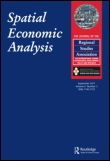
Spatial Economic Analysis
Fostering Interdisciplinary Dialogue in Spatial AnalysisSpatial Economic Analysis, published by Routledge Journals, Taylor & Francis Ltd, stands at the forefront of interdisciplinary research bridging economics, geography, and environmental science. With a notable impact factor reflected in its prestigious Q1 quartile rankings across key categories such as Earth and Planetary Sciences, Economics, Econometrics and Finance, and Geography, this journal is pivotal for scholars seeking to understand the intricate dynamics of spatial phenomena and their economic implications. Its comprehensive scope and rigorous peer-review process ensure that only high-quality research is disseminated, fostering innovative solutions to pressing global challenges. As of 2024, and since its inception in 2006, Spatial Economic Analysis continues to thrive as a vital platform for researchers, professionals, and students alike, facilitating access to cutting-edge studies that shape the future of spatial economics and policy.
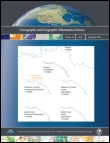
Cartography and Geographic Information Science
Innovating Cartography for a Changing WorldCartography and Geographic Information Science is a premier journal published by Taylor & Francis Inc, focusing on the interdisciplinary realms of geography, planning, and technological innovation. With an impressive impact factor and ranking in the top quartiles across various categories, including Q1 in Geography, Planning and Development and Q2 in Civil and Structural Engineering, this journal serves as an essential resource for researchers, professionals, and students alike, promoting cutting-edge research and advancements in cartography and geographic information systems. The journal disseminates high-quality articles that explore both theoretical and practical aspects of geographic information, aiming to enhance the understanding and application of spatial data. As the field evolves, Cartography and Geographic Information Science remains a vital forum for innovation and scholarly dialogue, offering accessible content to a global audience. With its commitment to rigor and relevance, it plays a critical role in advancing the landscapes of geography and environmental sciences.

Journal of Spatial Information Science
Connecting Ideas, Mapping FuturesThe Journal of Spatial Information Science is a premier open-access journal published by the University of Maine, dedicated to advancing research in the interdisciplinary fields of spatial information science, geography, and computer science. With an ISSN of 1948-660X, this journal has established itself as a significant contributor to the academic community since its inception in 2010, achieving notable rankings as evidenced by its classification in the Q2 quartile across multiple categories, including Computers in Earth Sciences and Geography. The journal offers a platform for innovative research, fostering collaboration and knowledge dissemination among researchers and practitioners. Its impact is further underscored by its Scopus rankings, placing it in the top percentiles across critical disciplines. With Open Access options available, the Journal of Spatial Information Science ensures that high-quality research is accessible to a broader audience, promoting the ongoing development of the field through thoughtful and rigorous academic inquiry.
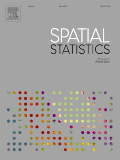
Spatial Statistics
Charting New Territories in Statistical ResearchSpatial Statistics is a premier journal published by ELSEVIER SCI LTD, focusing on innovative methodologies and applications in the realm of statistical analysis within spatial contexts. With an ISSN of 2211-6753, the journal has established itself as a significant contributor in its field since its inception in 2012, and continues to thrive, with its next volume projected through 2024. It holds a respectable Q2 ranking across several categories, including Computers in Earth Sciences, Management, Monitoring, Policy and Law, and Statistics and Probability, affirming its impact and relevance to researchers and professionals alike. The journal's commitment to publishing high-quality research enables scientists to advance understanding of spatial phenomena, facilitating informed decision-making in various applications ranging from environmental science to urban planning. As part of a robust academic community, Spatial Statistics invites submissions that push the boundaries of conventional statistical techniques, ensuring that the latest findings contribute significantly to the discipline's body of knowledge.

International Journal of Spatial Data Infrastructures Research
Fostering Collaboration in Spatial Data ManagementThe International Journal of Spatial Data Infrastructures Research is a prestigious, open-access publication dedicated to advancing knowledge in the field of spatial data infrastructures. Published by the European Commission, Joint Research Centre, this journal has been a vital resource since its inception in 2006, promoting innovative research that informs policy and practice in geographic information systems and spatial data management. With a robust commitment to open access, the journal ensures that critical findings are readily available to researchers, professionals, and students globally, fostering a collaborative environment for the development of spatial technologies. The journal's unique focus on spatial data infrastructures makes it an essential platform for sharing empirical studies, theoretical advancements, and practical applications, ultimately driving the evolution of smart, sustainable geospatial solutions.
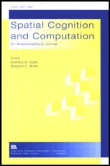
Spatial Cognition and Computation
Advancing Knowledge in Spatial IntelligenceSpatial Cognition and Computation is a premier academic journal published by TAYLOR & FRANCIS INC, focusing on the interdisciplinary fields of spatial cognition and computational analysis. With its ISSN 1387-5868 and E-ISSN 1542-7633, the journal has established itself as an authoritative source of innovative research since its inception in 2000. It is esteemed in various categories, receiving Q2 rankings in Computer Graphics and Computer-Aided Design, Computer Vision and Pattern Recognition, and Earth-Surface Processes, showcasing its impact in these dynamic fields. Additionally, it ranks in the Q3 tier for Experimental and Cognitive Psychology. The journal serves as a crucial platform for researchers, professionals, and students to explore cutting-edge developments and foster collaboration across disciplines. Although it is not currently an open-access journal, readers can access articles through library subscriptions or individual purchases, ensuring that its impactful research is widely disseminated in the academic community.

PAPERS IN REGIONAL SCIENCE
Innovating solutions through interdisciplinary research.PAPERS IN REGIONAL SCIENCE, published by Wiley, is a leading international journal dedicated to advancing the understanding of regional science and interdisciplinary approaches to geography and environmental planning. With an impressive impact factor and a prestigious Q1 ranking in both Environmental Science and Geography, Planning and Development, this journal serves as a critical platform for disseminating high-quality research from 1955 to 2024. Covering a diverse scope including regional development, spatial analysis, and environmental issues, it facilitates discussion and knowledge exchange among scholars and practitioners. The journal is recognized for its rigorous peer-review process and its commitment to addressing pressing societal challenges through research. As a vital resource for researchers, professionals, and students alike, PAPERS IN REGIONAL SCIENCE fosters innovation and collaboration within the field, contributing to a deeper understanding of the complexities of regional systems.
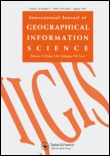
INTERNATIONAL JOURNAL OF GEOGRAPHICAL INFORMATION SCIENCE
Elevating Understanding of Geographic DynamicsThe INTERNATIONAL JOURNAL OF GEOGRAPHICAL INFORMATION SCIENCE, published by TAYLOR & FRANCIS LTD, stands as a premier platform in the fields of geography, planning and development, and information systems. With an impressive impact factor and recognized as a Q1 journal in 2023 across multiple categories, this esteemed publication underscores its significant role in advancing knowledge and application in geographical information sciences. Since its inception in 1997, the journal has provided vital insights and research findings, appealing to a diverse audience of researchers, professionals, and students dedicated to exploring the complexities of spatial data and its implications. Notably, it boasts exceptional Scopus rankings, positioning it among the top journals in its fields. While the journal does not offer open access, it remains a crucial resource for those looking to deepen their understanding and engagement with contemporary geographic and information science issues.
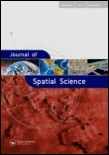
Journal of Spatial Science
Bridging Disciplines Through Spatial AnalysisThe Journal of Spatial Science, published by Taylor & Francis Ltd, serves as a prominent platform for the dissemination of research in the interdisciplinary fields of geography, atmospheric science, and energy. With an ISSN of 1449-8596 and an E-ISSN of 1836-5655, this journal has established itself as a vital resource since its inception in 2004, boasting an impressive convergence period extending to 2024. Recognized in the Q3 quartile for Atmospheric Science and Energy (miscellaneous), and achieving a Q2 classification in Geography, Planning and Development in 2023, the journal not only reflects the evolving complexities of spatial science but also underscores its increasing relevance in addressing contemporary global challenges. The journal holds a commendable position in Scopus rankings, with notable placements in various categories, further highlighting its academic significance. Researchers, professionals, and students are encouraged to engage with the rich content offered, as the Journal of Spatial Science remains committed to advancing knowledge and fostering discussions pertinent to spatial analysis and its applications.

Cadernos de Geografia
Navigating the Future of Geography and Social SciencesCadernos de Geografia is a distinguished biannual journal published by UNIVERSIDADE DE COIMBRA, FACULDADE DE LETRAS, dedicated to the field of geography and related social sciences. With its ISSN 0871-1623 and E-ISSN 2183-4016, this journal has been a prominent platform for the dissemination of high-quality research since it became open access in 2012. Situated in Coimbra, Portugal, it aims to foster academic excellence by providing an inclusive space for innovative studies that explore contemporary geographical issues. Cadernos de Geografia encourages submissions that address diverse aspects of geography, ranging from environmental studies to urban planning, making it an invaluable resource for researchers, professionals, and students alike. As a part of the growing trend in open-access publishing, it enhances the global reach and accessibility of geographical research, thereby contributing to the enrichment of knowledge in the field.